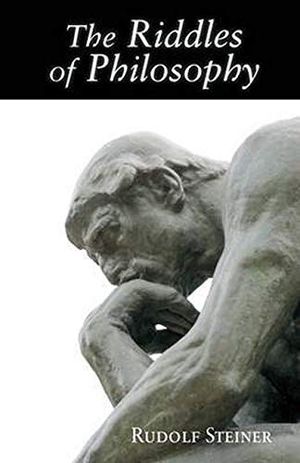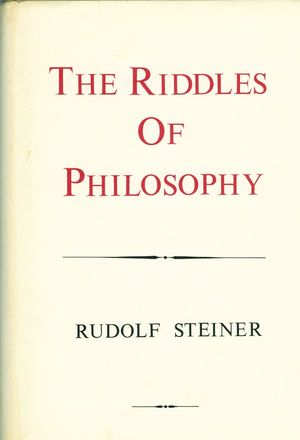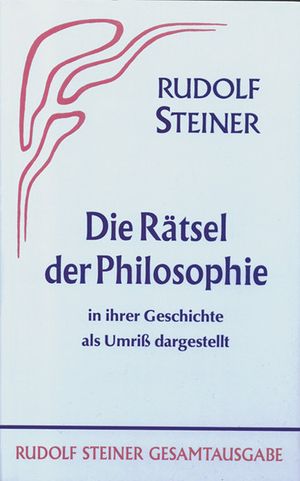GA 18



The Riddles of Philosophy Presented as an Outline of Its History
Die Rätsel der Philosophie in ihrer Geschichte als Umriss dargestellt
The history of philosophy from an anthroposophical point of view. An account of the development of thought and consciousness, its shaping in the most diverse, sometimes most contradictory worldviews by representative thinkers as attempts by the human spirit to explore its position in the world on all sides. In the process, reference is made to the central current of philosophy to create all possibilities to ultimately help the human being, as a free, creative personality founded in himself, to be born into a higher world with new experiences and challenges.
„When I expanded my book "Welt- und Lebensanschauungen im neunzehnten Jahrhundert" (World and Life Views in the Nineteenth Century) into the present "Die Rätsel der Philosophie" (The Riddles of Philosophy) when the second edition appeared in 1914, I wanted to show what of the historically occurring worldviews presents itself to the present-day observer in such a way that his or her own feeling on the emergence of the philosophical riddles in consciousness can be deepened by the feeling that the thinkers emerging in the sequence of times have had about these riddles. Such a deepening has something satisfying for the philosophical wrestler. What his own soul strives for gains strength by seeing how this striving has taken shape in people to whom life has assigned points of view that are close to or far from his own. In this way, I wanted to serve those who need an account of the development of philosophy as a supplement to their own paths of thought.
Such a supplement will be required by those who wish to feel at one with the spiritual work of humanity on their own path of thought. He who wishes to see that his thought-work has its root in a quite general human need of the soul. He can see this when the essentials of the historical world views rise before his gaze. But for many observers such a rising has something oppressive about it. It forces doubt into their souls. They see how the successive thinkers are in contradiction with preceding or succeeding ones.
I wanted to show that this oppressiveness is erased by another. We look at two thinkers. At first glance, the contradiction between them is embarrassing. We approach their thoughts. One of them draws attention to a completely different area of the world than the other. Let us suppose that one of them has developed in himself the mood of the soul which directs attention to the way thoughts unfold in the inner weaving of the soul. For him it becomes a riddle that this inner soul event in cognition should become decisive over the essence of the outer world. This starting point gives his whole thinking its colouring. He will speak powerfully of the creative thought-being. This will colour everything he says in an idealistic way. Another directs the gaze to the outer sensuous happening. The thoughts through which he grasps this happening do not enter his consciousness in their independent power. He will give the riddles of the world a turn that leads them into the realm in which the basis of the world itself has an appearance reminiscent of the sensuous world.
If one approaches the historical development of the worldviews with presuppositions that result from such an orientation of thought, one can rise above the annihilation that these worldviews show for one another and behold a mutually sustaining quality in them.“ (Lit.:GA 18, p. 7f)
Contents
FIRST VOLUME
- FOR ORIENTATION ON THE GUIDELINES OF THE PRESENTATION
- THE WORLD VIEW OF THE GREEK THINKERS
- THE LIFE OF THOUGHT FROM THE BEGINNING OF THE CHRISTIAN ERA TO JOHANNES SCOTUS OR ERIGENA
- THE WORLD VIEWS IN THE MIDDLE AGES
- THE WORLD VIEWS OF THE MOST RECENT AGE OF THOUGHT DEVELOPMENT
- THE AGE OF KANT AND GOETHE
- THE CLASSICS OF WORLD AND LIFE VIEWS
- REACTIONARY WORLD VIEWS
- THE RADICAL WORLD VIEWS
VOLUME TWO
- INTRODUCTORY REMARKS TO THE NEW EDITION 1914
- THE STRUGGLE FOR THE MIND
- DARWINISM AND WORLDVIEW
- THE WORLD AS ILLUSION
- ECHOES OF THE KANTIAN IMAGINATION
- WORLDVIEWS OF SCIENTIFIC REALITY
- MODERN IDEALISTIC WORLDVIEWS
- MODERN MAN AND HIS WORLDVIEW
- SKETCHY OUTLOOK ON AN ANTHROPOSOPHY
Literature
- Rudolf Steiner: The Riddles of Philosophy: Presented in an Outline of its History. CW 18. Reprint Edition. Anthroposophic Press 2009. ISBN 978-0880107112; eBook ASIN B00AQM710O rsarchive.org
- Rudolf Steiner: The Riddles of Philosophy. Anthroposophic Press 1973 rsarchive.org
German
- Rudolf Steiner: Die Rätsel der Philosophie in ihrer Geschichte als Umriß dargestellt, GA 18 (1985), ISBN 3-7274-0180-X English: rsarchive.org German: pdf pdf(2) html mobi epub archive.org
Original editions
- Welt- und Lebensanschauungen im neunzehnten Jahrhundert, Verlag Siegfried Cronbach, Berlin 1900 pdf (1900)
- Die Rätsel der Philosophie in ihrer Geschichte als Umriß dargestellt, Verlag Siegfried Cronbach, Berlin 1914 pdf (1914)
- Die Rätsel der Philosophie in ihrer Geschichte als Umriss dargestellt, Philosophisch-Anthroposophischer Verlag am Goetheanum, Dornach 1924 pdf (1924)
 |
References to the work of Rudolf Steiner follow Rudolf Steiner's Collected Works (CW or GA), Rudolf Steiner Verlag, Dornach/Switzerland, unless otherwise stated.
Email: verlag@steinerverlag.com URL: www.steinerverlag.com. Index to the Complete Works of Rudolf Steiner - Aelzina Books A complete list by Volume Number and a full list of known English translations you may also find at Rudolf Steiner's Collected Works Rudolf Steiner Archive - The largest online collection of Rudolf Steiner's books, lectures and articles in English. Rudolf Steiner Audio - Recorded and Read by Dale Brunsvold steinerbooks.org - Anthroposophic Press Inc. (USA) Rudolf Steiner Handbook - Christian Karl's proven standard work for orientation in Rudolf Steiner's Collected Works for free download as PDF. |
